Strategic Management Principles and Practices in Hospitality Org
VerifiedAdded on 2023/06/10
|14
|4111
|55
Report
AI Summary
This report provides an in-depth analysis of strategic management principles and practices within the hospitality industry, focusing on Marriott International Inc. The report examines corporate-level strategy formulation, highlighting Marriott's CSR strategy and its focus on enhancing market competitiveness. It employs strategic management models like SWOT analysis and Porter's Five Forces to assess Marriott's strengths, weaknesses, opportunities, and threats, as well as competitive forces within the industry. Additionally, the report includes a value chain analysis to identify factors contributing to cost efficiency and competitive advantage. Key principles of strategic management, such as focusing on important parameters, leveraging strengths, effective communication, maintaining flexibility, and investing in outside help, are discussed in the context of organizational growth and development within the hospitality sector. The report concludes by emphasizing the significance of these principles in achieving strategic objectives and maintaining a competitive edge.
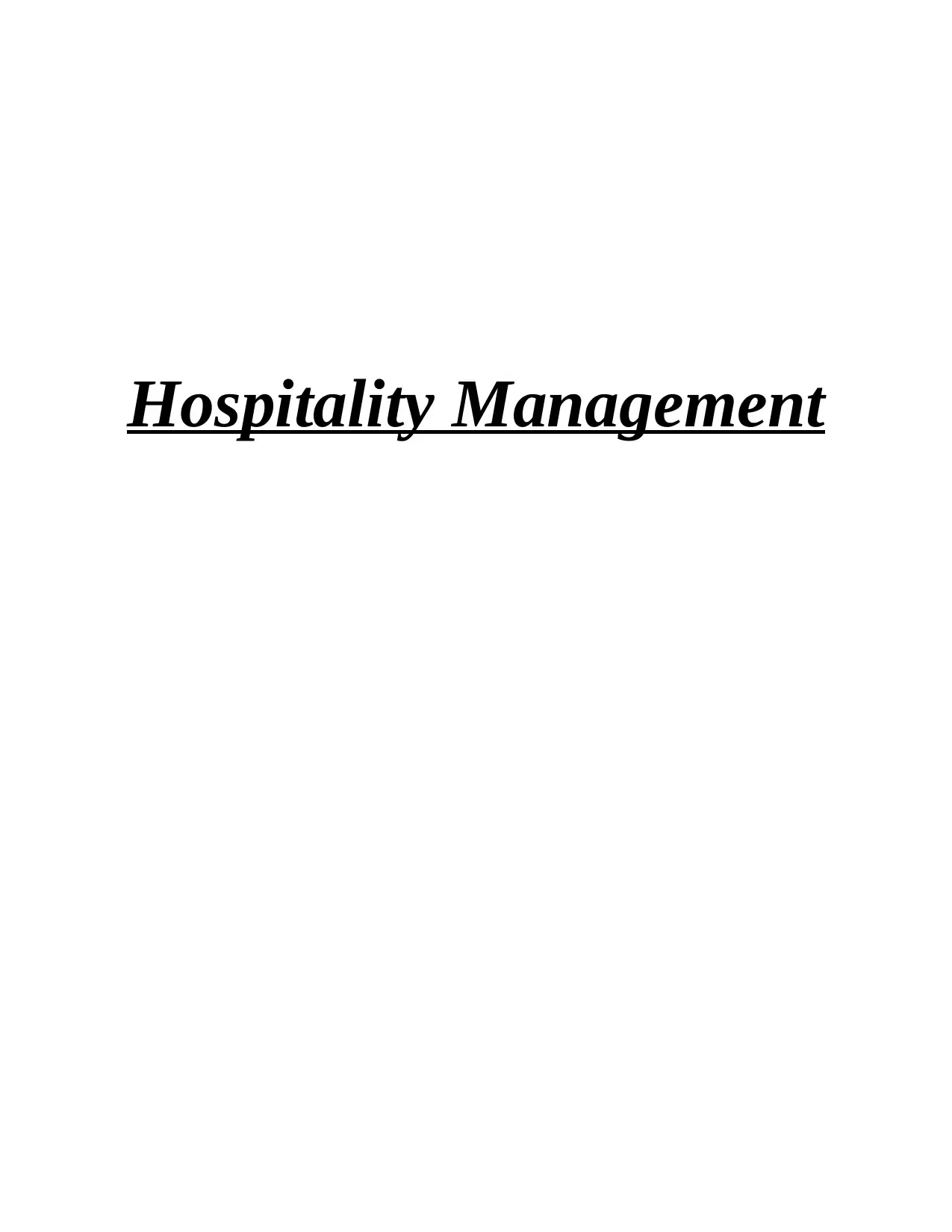
Hospitality Management
Paraphrase This Document
Need a fresh take? Get an instant paraphrase of this document with our AI Paraphraser
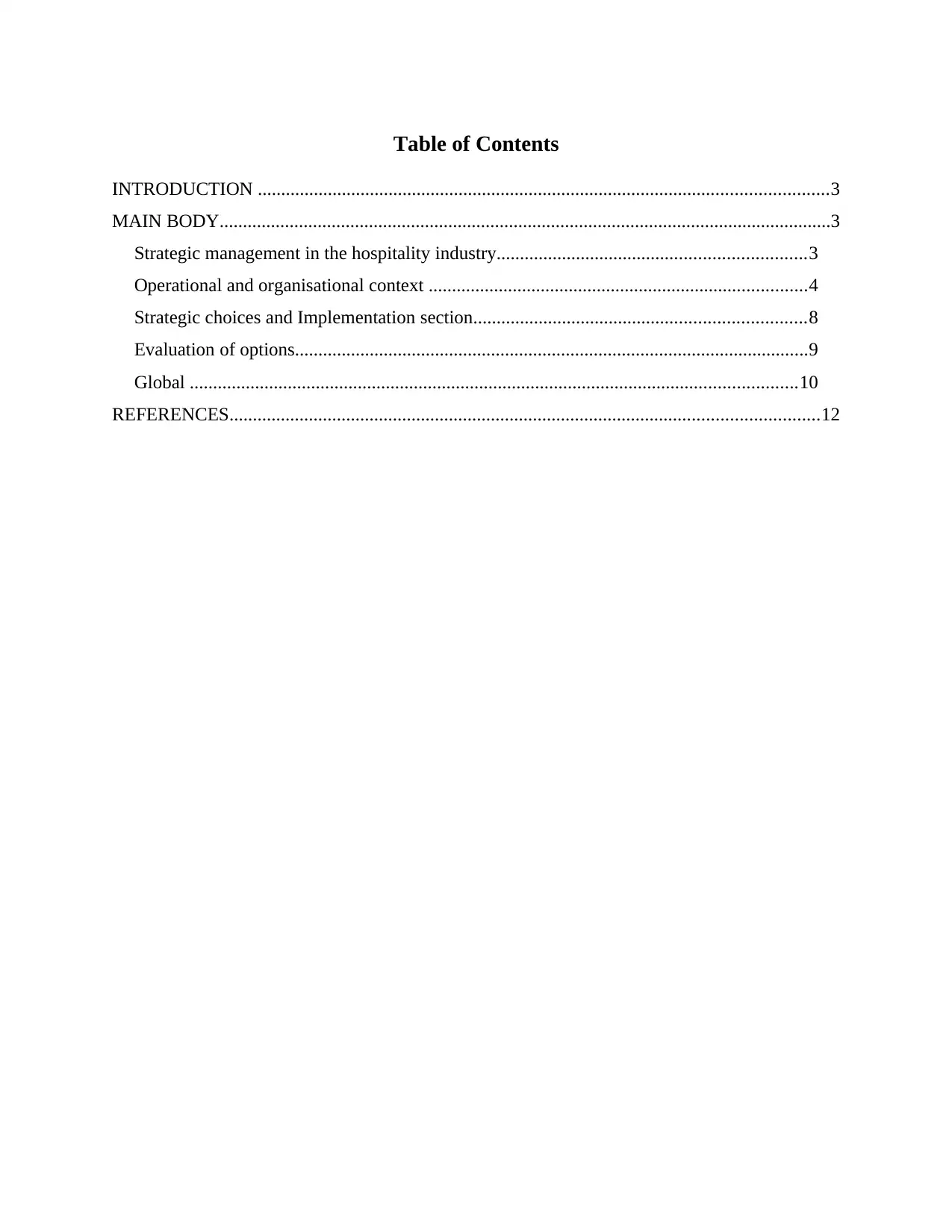
Table of Contents
INTRODUCTION ..........................................................................................................................3
MAIN BODY...................................................................................................................................3
Strategic management in the hospitality industry..................................................................3
Operational and organisational context .................................................................................4
Strategic choices and Implementation section.......................................................................8
Evaluation of options..............................................................................................................9
Global ..................................................................................................................................10
REFERENCES..............................................................................................................................12
INTRODUCTION ..........................................................................................................................3
MAIN BODY...................................................................................................................................3
Strategic management in the hospitality industry..................................................................3
Operational and organisational context .................................................................................4
Strategic choices and Implementation section.......................................................................8
Evaluation of options..............................................................................................................9
Global ..................................................................................................................................10
REFERENCES..............................................................................................................................12
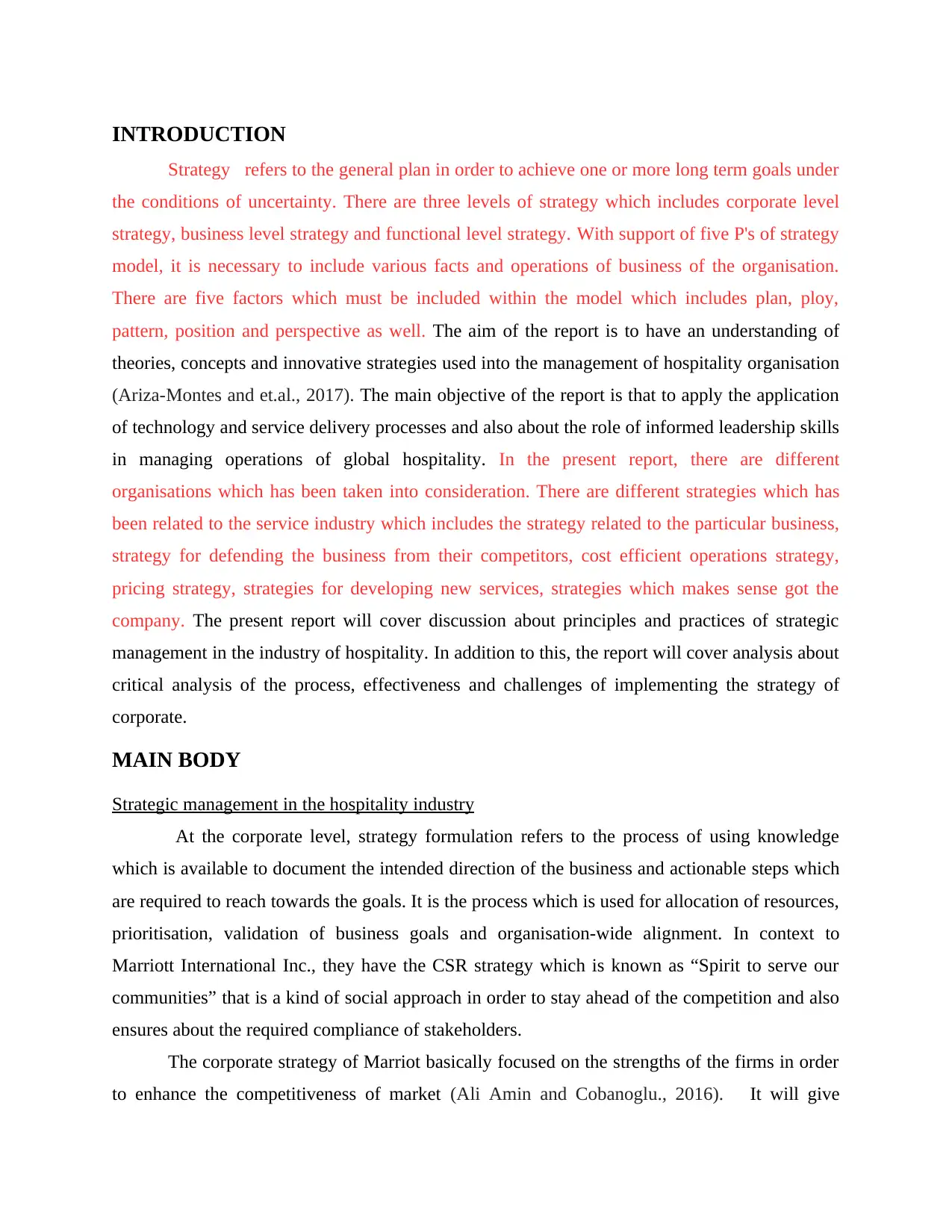
INTRODUCTION
Strategy refers to the general plan in order to achieve one or more long term goals under
the conditions of uncertainty. There are three levels of strategy which includes corporate level
strategy, business level strategy and functional level strategy. With support of five P's of strategy
model, it is necessary to include various facts and operations of business of the organisation.
There are five factors which must be included within the model which includes plan, ploy,
pattern, position and perspective as well. The aim of the report is to have an understanding of
theories, concepts and innovative strategies used into the management of hospitality organisation
(Ariza-Montes and et.al., 2017). The main objective of the report is that to apply the application
of technology and service delivery processes and also about the role of informed leadership skills
in managing operations of global hospitality. In the present report, there are different
organisations which has been taken into consideration. There are different strategies which has
been related to the service industry which includes the strategy related to the particular business,
strategy for defending the business from their competitors, cost efficient operations strategy,
pricing strategy, strategies for developing new services, strategies which makes sense got the
company. The present report will cover discussion about principles and practices of strategic
management in the industry of hospitality. In addition to this, the report will cover analysis about
critical analysis of the process, effectiveness and challenges of implementing the strategy of
corporate.
MAIN BODY
Strategic management in the hospitality industry
At the corporate level, strategy formulation refers to the process of using knowledge
which is available to document the intended direction of the business and actionable steps which
are required to reach towards the goals. It is the process which is used for allocation of resources,
prioritisation, validation of business goals and organisation-wide alignment. In context to
Marriott International Inc., they have the CSR strategy which is known as “Spirit to serve our
communities” that is a kind of social approach in order to stay ahead of the competition and also
ensures about the required compliance of stakeholders.
The corporate strategy of Marriot basically focused on the strengths of the firms in order
to enhance the competitiveness of market (Ali Amin and Cobanoglu., 2016). It will give
Strategy refers to the general plan in order to achieve one or more long term goals under
the conditions of uncertainty. There are three levels of strategy which includes corporate level
strategy, business level strategy and functional level strategy. With support of five P's of strategy
model, it is necessary to include various facts and operations of business of the organisation.
There are five factors which must be included within the model which includes plan, ploy,
pattern, position and perspective as well. The aim of the report is to have an understanding of
theories, concepts and innovative strategies used into the management of hospitality organisation
(Ariza-Montes and et.al., 2017). The main objective of the report is that to apply the application
of technology and service delivery processes and also about the role of informed leadership skills
in managing operations of global hospitality. In the present report, there are different
organisations which has been taken into consideration. There are different strategies which has
been related to the service industry which includes the strategy related to the particular business,
strategy for defending the business from their competitors, cost efficient operations strategy,
pricing strategy, strategies for developing new services, strategies which makes sense got the
company. The present report will cover discussion about principles and practices of strategic
management in the industry of hospitality. In addition to this, the report will cover analysis about
critical analysis of the process, effectiveness and challenges of implementing the strategy of
corporate.
MAIN BODY
Strategic management in the hospitality industry
At the corporate level, strategy formulation refers to the process of using knowledge
which is available to document the intended direction of the business and actionable steps which
are required to reach towards the goals. It is the process which is used for allocation of resources,
prioritisation, validation of business goals and organisation-wide alignment. In context to
Marriott International Inc., they have the CSR strategy which is known as “Spirit to serve our
communities” that is a kind of social approach in order to stay ahead of the competition and also
ensures about the required compliance of stakeholders.
The corporate strategy of Marriot basically focused on the strengths of the firms in order
to enhance the competitiveness of market (Ali Amin and Cobanoglu., 2016). It will give
⊘ This is a preview!⊘
Do you want full access?
Subscribe today to unlock all pages.

Trusted by 1+ million students worldwide
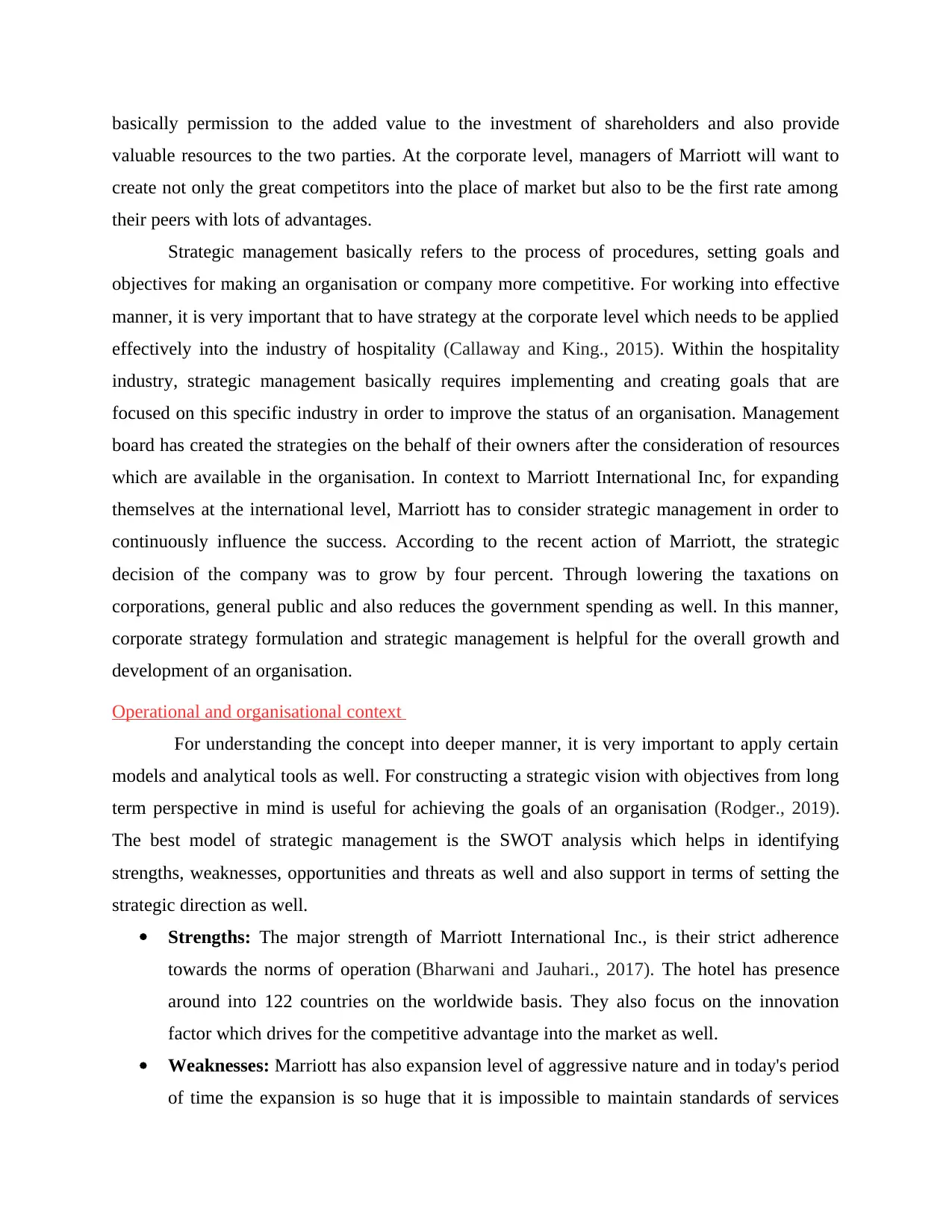
basically permission to the added value to the investment of shareholders and also provide
valuable resources to the two parties. At the corporate level, managers of Marriott will want to
create not only the great competitors into the place of market but also to be the first rate among
their peers with lots of advantages.
Strategic management basically refers to the process of procedures, setting goals and
objectives for making an organisation or company more competitive. For working into effective
manner, it is very important that to have strategy at the corporate level which needs to be applied
effectively into the industry of hospitality (Callaway and King., 2015). Within the hospitality
industry, strategic management basically requires implementing and creating goals that are
focused on this specific industry in order to improve the status of an organisation. Management
board has created the strategies on the behalf of their owners after the consideration of resources
which are available in the organisation. In context to Marriott International Inc, for expanding
themselves at the international level, Marriott has to consider strategic management in order to
continuously influence the success. According to the recent action of Marriott, the strategic
decision of the company was to grow by four percent. Through lowering the taxations on
corporations, general public and also reduces the government spending as well. In this manner,
corporate strategy formulation and strategic management is helpful for the overall growth and
development of an organisation.
Operational and organisational context
For understanding the concept into deeper manner, it is very important to apply certain
models and analytical tools as well. For constructing a strategic vision with objectives from long
term perspective in mind is useful for achieving the goals of an organisation (Rodger., 2019).
The best model of strategic management is the SWOT analysis which helps in identifying
strengths, weaknesses, opportunities and threats as well and also support in terms of setting the
strategic direction as well.
Strengths: The major strength of Marriott International Inc., is their strict adherence
towards the norms of operation (Bharwani and Jauhari., 2017). The hotel has presence
around into 122 countries on the worldwide basis. They also focus on the innovation
factor which drives for the competitive advantage into the market as well.
Weaknesses: Marriott has also expansion level of aggressive nature and in today's period
of time the expansion is so huge that it is impossible to maintain standards of services
valuable resources to the two parties. At the corporate level, managers of Marriott will want to
create not only the great competitors into the place of market but also to be the first rate among
their peers with lots of advantages.
Strategic management basically refers to the process of procedures, setting goals and
objectives for making an organisation or company more competitive. For working into effective
manner, it is very important that to have strategy at the corporate level which needs to be applied
effectively into the industry of hospitality (Callaway and King., 2015). Within the hospitality
industry, strategic management basically requires implementing and creating goals that are
focused on this specific industry in order to improve the status of an organisation. Management
board has created the strategies on the behalf of their owners after the consideration of resources
which are available in the organisation. In context to Marriott International Inc, for expanding
themselves at the international level, Marriott has to consider strategic management in order to
continuously influence the success. According to the recent action of Marriott, the strategic
decision of the company was to grow by four percent. Through lowering the taxations on
corporations, general public and also reduces the government spending as well. In this manner,
corporate strategy formulation and strategic management is helpful for the overall growth and
development of an organisation.
Operational and organisational context
For understanding the concept into deeper manner, it is very important to apply certain
models and analytical tools as well. For constructing a strategic vision with objectives from long
term perspective in mind is useful for achieving the goals of an organisation (Rodger., 2019).
The best model of strategic management is the SWOT analysis which helps in identifying
strengths, weaknesses, opportunities and threats as well and also support in terms of setting the
strategic direction as well.
Strengths: The major strength of Marriott International Inc., is their strict adherence
towards the norms of operation (Bharwani and Jauhari., 2017). The hotel has presence
around into 122 countries on the worldwide basis. They also focus on the innovation
factor which drives for the competitive advantage into the market as well.
Weaknesses: Marriott has also expansion level of aggressive nature and in today's period
of time the expansion is so huge that it is impossible to maintain standards of services
Paraphrase This Document
Need a fresh take? Get an instant paraphrase of this document with our AI Paraphraser
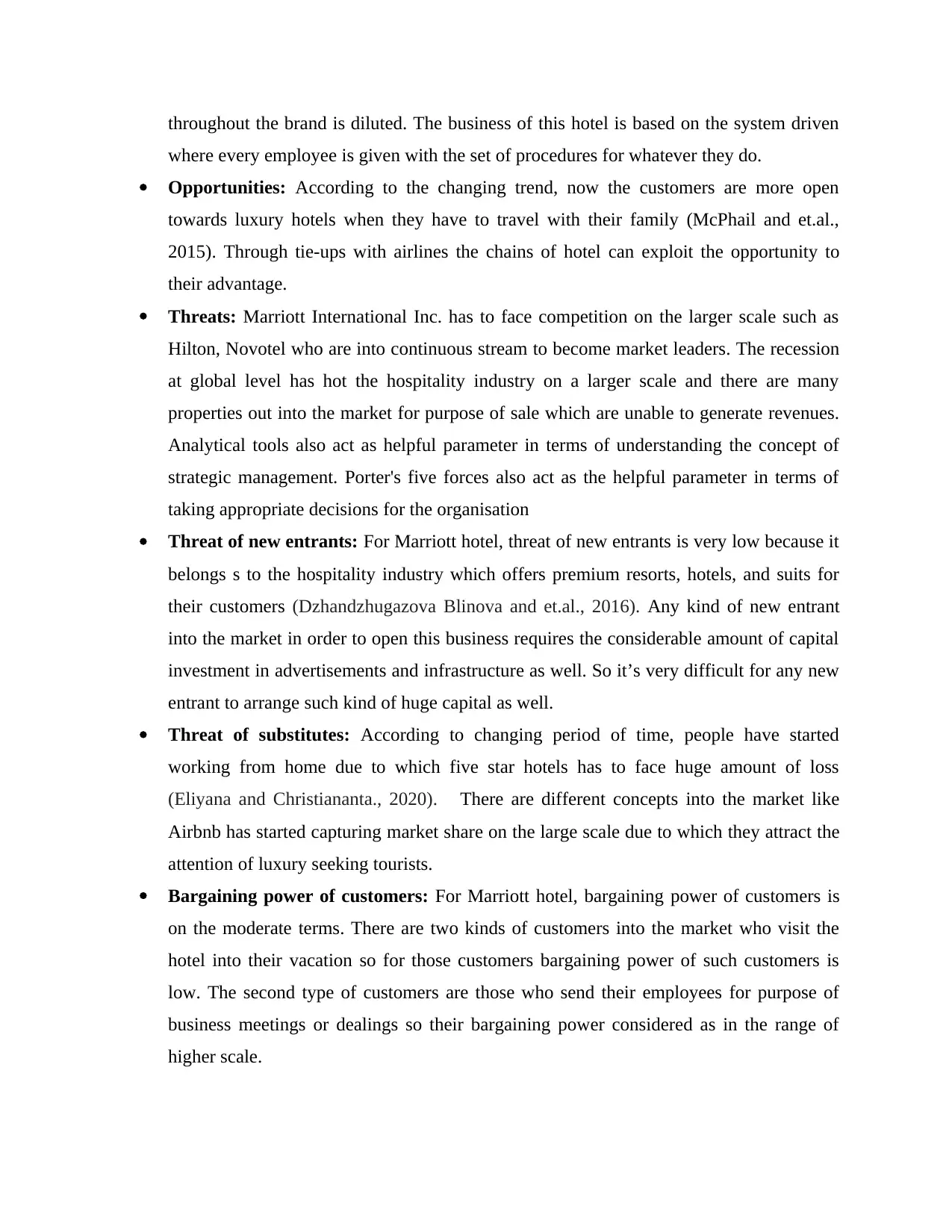
throughout the brand is diluted. The business of this hotel is based on the system driven
where every employee is given with the set of procedures for whatever they do.
Opportunities: According to the changing trend, now the customers are more open
towards luxury hotels when they have to travel with their family (McPhail and et.al.,
2015). Through tie-ups with airlines the chains of hotel can exploit the opportunity to
their advantage.
Threats: Marriott International Inc. has to face competition on the larger scale such as
Hilton, Novotel who are into continuous stream to become market leaders. The recession
at global level has hot the hospitality industry on a larger scale and there are many
properties out into the market for purpose of sale which are unable to generate revenues.
Analytical tools also act as helpful parameter in terms of understanding the concept of
strategic management. Porter's five forces also act as the helpful parameter in terms of
taking appropriate decisions for the organisation
Threat of new entrants: For Marriott hotel, threat of new entrants is very low because it
belongs s to the hospitality industry which offers premium resorts, hotels, and suits for
their customers (Dzhandzhugazova Blinova and et.al., 2016). Any kind of new entrant
into the market in order to open this business requires the considerable amount of capital
investment in advertisements and infrastructure as well. So it’s very difficult for any new
entrant to arrange such kind of huge capital as well.
Threat of substitutes: According to changing period of time, people have started
working from home due to which five star hotels has to face huge amount of loss
(Eliyana and Christiananta., 2020). There are different concepts into the market like
Airbnb has started capturing market share on the large scale due to which they attract the
attention of luxury seeking tourists.
Bargaining power of customers: For Marriott hotel, bargaining power of customers is
on the moderate terms. There are two kinds of customers into the market who visit the
hotel into their vacation so for those customers bargaining power of such customers is
low. The second type of customers are those who send their employees for purpose of
business meetings or dealings so their bargaining power considered as in the range of
higher scale.
where every employee is given with the set of procedures for whatever they do.
Opportunities: According to the changing trend, now the customers are more open
towards luxury hotels when they have to travel with their family (McPhail and et.al.,
2015). Through tie-ups with airlines the chains of hotel can exploit the opportunity to
their advantage.
Threats: Marriott International Inc. has to face competition on the larger scale such as
Hilton, Novotel who are into continuous stream to become market leaders. The recession
at global level has hot the hospitality industry on a larger scale and there are many
properties out into the market for purpose of sale which are unable to generate revenues.
Analytical tools also act as helpful parameter in terms of understanding the concept of
strategic management. Porter's five forces also act as the helpful parameter in terms of
taking appropriate decisions for the organisation
Threat of new entrants: For Marriott hotel, threat of new entrants is very low because it
belongs s to the hospitality industry which offers premium resorts, hotels, and suits for
their customers (Dzhandzhugazova Blinova and et.al., 2016). Any kind of new entrant
into the market in order to open this business requires the considerable amount of capital
investment in advertisements and infrastructure as well. So it’s very difficult for any new
entrant to arrange such kind of huge capital as well.
Threat of substitutes: According to changing period of time, people have started
working from home due to which five star hotels has to face huge amount of loss
(Eliyana and Christiananta., 2020). There are different concepts into the market like
Airbnb has started capturing market share on the large scale due to which they attract the
attention of luxury seeking tourists.
Bargaining power of customers: For Marriott hotel, bargaining power of customers is
on the moderate terms. There are two kinds of customers into the market who visit the
hotel into their vacation so for those customers bargaining power of such customers is
low. The second type of customers are those who send their employees for purpose of
business meetings or dealings so their bargaining power considered as in the range of
higher scale.
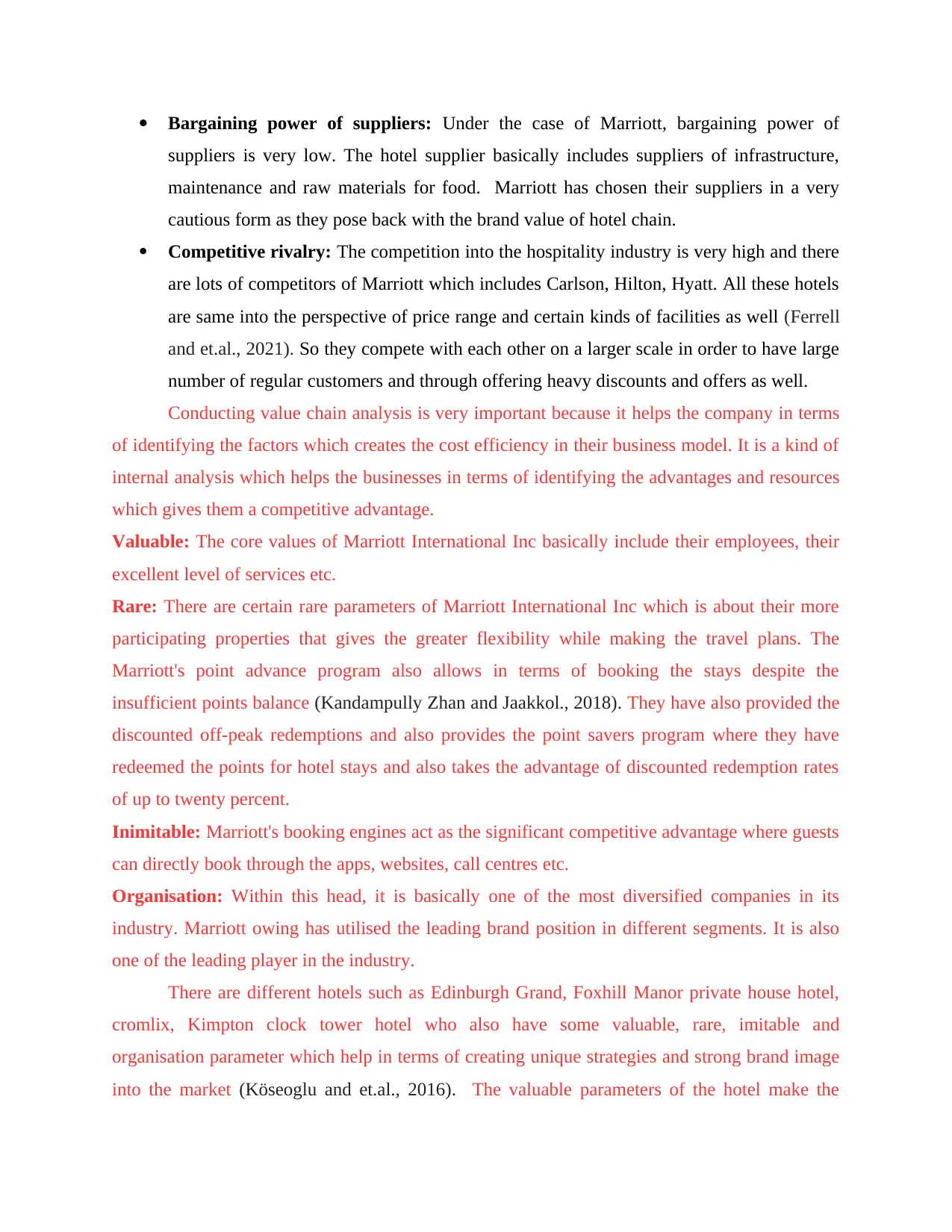
Bargaining power of suppliers: Under the case of Marriott, bargaining power of
suppliers is very low. The hotel supplier basically includes suppliers of infrastructure,
maintenance and raw materials for food. Marriott has chosen their suppliers in a very
cautious form as they pose back with the brand value of hotel chain.
Competitive rivalry: The competition into the hospitality industry is very high and there
are lots of competitors of Marriott which includes Carlson, Hilton, Hyatt. All these hotels
are same into the perspective of price range and certain kinds of facilities as well (Ferrell
and et.al., 2021). So they compete with each other on a larger scale in order to have large
number of regular customers and through offering heavy discounts and offers as well.
Conducting value chain analysis is very important because it helps the company in terms
of identifying the factors which creates the cost efficiency in their business model. It is a kind of
internal analysis which helps the businesses in terms of identifying the advantages and resources
which gives them a competitive advantage.
Valuable: The core values of Marriott International Inc basically include their employees, their
excellent level of services etc.
Rare: There are certain rare parameters of Marriott International Inc which is about their more
participating properties that gives the greater flexibility while making the travel plans. The
Marriott's point advance program also allows in terms of booking the stays despite the
insufficient points balance (Kandampully Zhan and Jaakkol., 2018). They have also provided the
discounted off-peak redemptions and also provides the point savers program where they have
redeemed the points for hotel stays and also takes the advantage of discounted redemption rates
of up to twenty percent.
Inimitable: Marriott's booking engines act as the significant competitive advantage where guests
can directly book through the apps, websites, call centres etc.
Organisation: Within this head, it is basically one of the most diversified companies in its
industry. Marriott owing has utilised the leading brand position in different segments. It is also
one of the leading player in the industry.
There are different hotels such as Edinburgh Grand, Foxhill Manor private house hotel,
cromlix, Kimpton clock tower hotel who also have some valuable, rare, imitable and
organisation parameter which help in terms of creating unique strategies and strong brand image
into the market (Köseoglu and et.al., 2016). The valuable parameters of the hotel make the
suppliers is very low. The hotel supplier basically includes suppliers of infrastructure,
maintenance and raw materials for food. Marriott has chosen their suppliers in a very
cautious form as they pose back with the brand value of hotel chain.
Competitive rivalry: The competition into the hospitality industry is very high and there
are lots of competitors of Marriott which includes Carlson, Hilton, Hyatt. All these hotels
are same into the perspective of price range and certain kinds of facilities as well (Ferrell
and et.al., 2021). So they compete with each other on a larger scale in order to have large
number of regular customers and through offering heavy discounts and offers as well.
Conducting value chain analysis is very important because it helps the company in terms
of identifying the factors which creates the cost efficiency in their business model. It is a kind of
internal analysis which helps the businesses in terms of identifying the advantages and resources
which gives them a competitive advantage.
Valuable: The core values of Marriott International Inc basically include their employees, their
excellent level of services etc.
Rare: There are certain rare parameters of Marriott International Inc which is about their more
participating properties that gives the greater flexibility while making the travel plans. The
Marriott's point advance program also allows in terms of booking the stays despite the
insufficient points balance (Kandampully Zhan and Jaakkol., 2018). They have also provided the
discounted off-peak redemptions and also provides the point savers program where they have
redeemed the points for hotel stays and also takes the advantage of discounted redemption rates
of up to twenty percent.
Inimitable: Marriott's booking engines act as the significant competitive advantage where guests
can directly book through the apps, websites, call centres etc.
Organisation: Within this head, it is basically one of the most diversified companies in its
industry. Marriott owing has utilised the leading brand position in different segments. It is also
one of the leading player in the industry.
There are different hotels such as Edinburgh Grand, Foxhill Manor private house hotel,
cromlix, Kimpton clock tower hotel who also have some valuable, rare, imitable and
organisation parameter which help in terms of creating unique strategies and strong brand image
into the market (Köseoglu and et.al., 2016). The valuable parameters of the hotel make the
⊘ This is a preview!⊘
Do you want full access?
Subscribe today to unlock all pages.

Trusted by 1+ million students worldwide
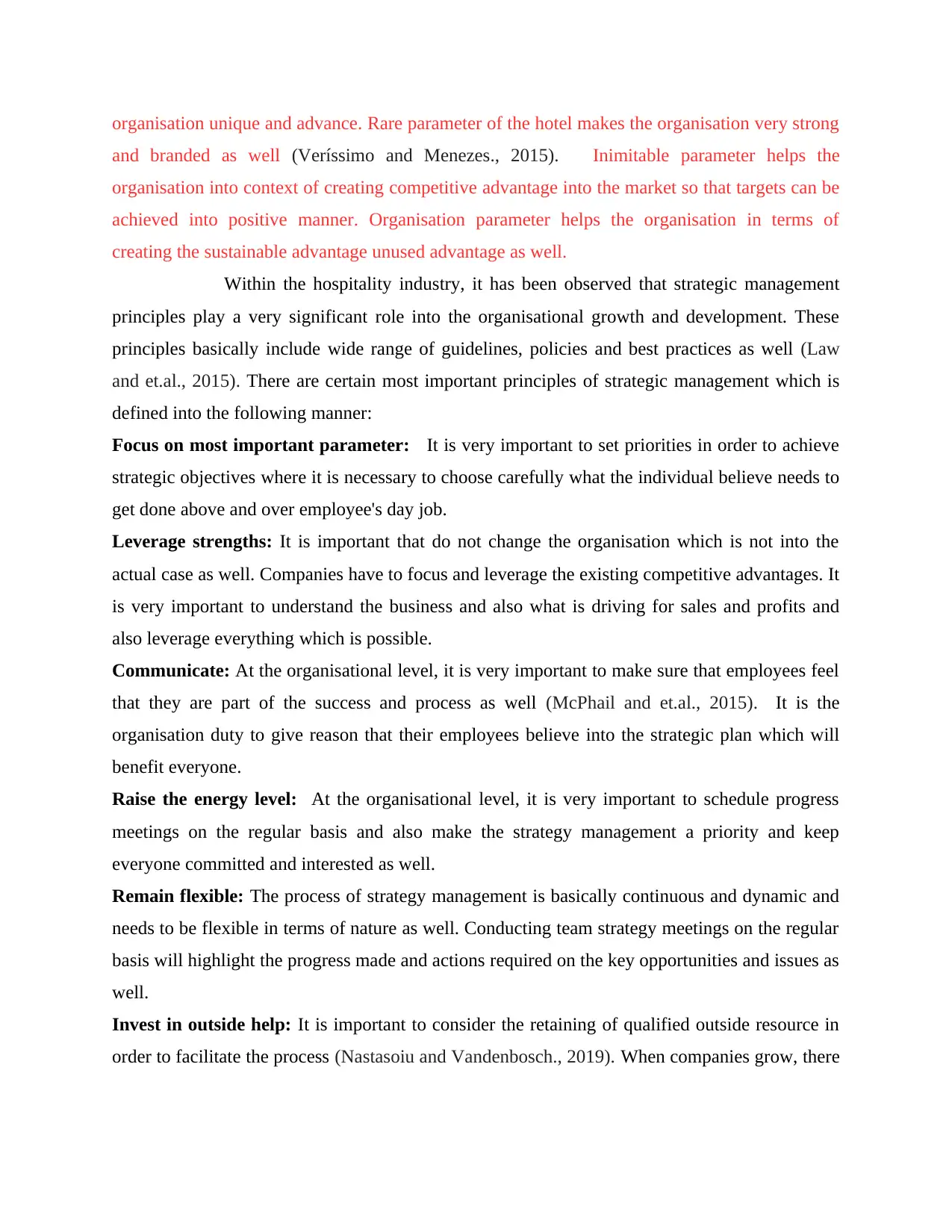
organisation unique and advance. Rare parameter of the hotel makes the organisation very strong
and branded as well (Veríssimo and Menezes., 2015). Inimitable parameter helps the
organisation into context of creating competitive advantage into the market so that targets can be
achieved into positive manner. Organisation parameter helps the organisation in terms of
creating the sustainable advantage unused advantage as well.
Within the hospitality industry, it has been observed that strategic management
principles play a very significant role into the organisational growth and development. These
principles basically include wide range of guidelines, policies and best practices as well (Law
and et.al., 2015). There are certain most important principles of strategic management which is
defined into the following manner:
Focus on most important parameter: It is very important to set priorities in order to achieve
strategic objectives where it is necessary to choose carefully what the individual believe needs to
get done above and over employee's day job.
Leverage strengths: It is important that do not change the organisation which is not into the
actual case as well. Companies have to focus and leverage the existing competitive advantages. It
is very important to understand the business and also what is driving for sales and profits and
also leverage everything which is possible.
Communicate: At the organisational level, it is very important to make sure that employees feel
that they are part of the success and process as well (McPhail and et.al., 2015). It is the
organisation duty to give reason that their employees believe into the strategic plan which will
benefit everyone.
Raise the energy level: At the organisational level, it is very important to schedule progress
meetings on the regular basis and also make the strategy management a priority and keep
everyone committed and interested as well.
Remain flexible: The process of strategy management is basically continuous and dynamic and
needs to be flexible in terms of nature as well. Conducting team strategy meetings on the regular
basis will highlight the progress made and actions required on the key opportunities and issues as
well.
Invest in outside help: It is important to consider the retaining of qualified outside resource in
order to facilitate the process (Nastasoiu and Vandenbosch., 2019). When companies grow, there
and branded as well (Veríssimo and Menezes., 2015). Inimitable parameter helps the
organisation into context of creating competitive advantage into the market so that targets can be
achieved into positive manner. Organisation parameter helps the organisation in terms of
creating the sustainable advantage unused advantage as well.
Within the hospitality industry, it has been observed that strategic management
principles play a very significant role into the organisational growth and development. These
principles basically include wide range of guidelines, policies and best practices as well (Law
and et.al., 2015). There are certain most important principles of strategic management which is
defined into the following manner:
Focus on most important parameter: It is very important to set priorities in order to achieve
strategic objectives where it is necessary to choose carefully what the individual believe needs to
get done above and over employee's day job.
Leverage strengths: It is important that do not change the organisation which is not into the
actual case as well. Companies have to focus and leverage the existing competitive advantages. It
is very important to understand the business and also what is driving for sales and profits and
also leverage everything which is possible.
Communicate: At the organisational level, it is very important to make sure that employees feel
that they are part of the success and process as well (McPhail and et.al., 2015). It is the
organisation duty to give reason that their employees believe into the strategic plan which will
benefit everyone.
Raise the energy level: At the organisational level, it is very important to schedule progress
meetings on the regular basis and also make the strategy management a priority and keep
everyone committed and interested as well.
Remain flexible: The process of strategy management is basically continuous and dynamic and
needs to be flexible in terms of nature as well. Conducting team strategy meetings on the regular
basis will highlight the progress made and actions required on the key opportunities and issues as
well.
Invest in outside help: It is important to consider the retaining of qualified outside resource in
order to facilitate the process (Nastasoiu and Vandenbosch., 2019). When companies grow, there
Paraphrase This Document
Need a fresh take? Get an instant paraphrase of this document with our AI Paraphraser
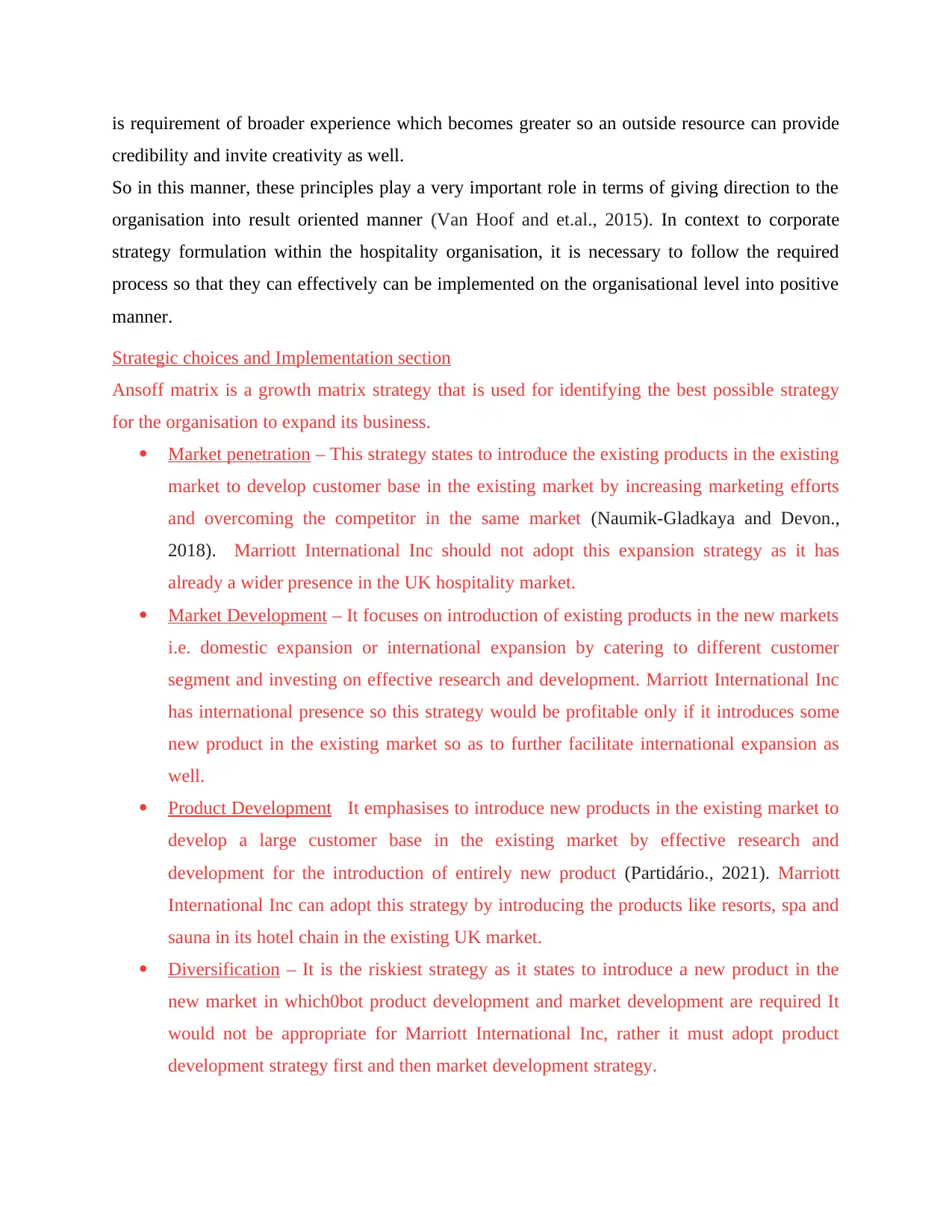
is requirement of broader experience which becomes greater so an outside resource can provide
credibility and invite creativity as well.
So in this manner, these principles play a very important role in terms of giving direction to the
organisation into result oriented manner (Van Hoof and et.al., 2015). In context to corporate
strategy formulation within the hospitality organisation, it is necessary to follow the required
process so that they can effectively can be implemented on the organisational level into positive
manner.
Strategic choices and Implementation section
Ansoff matrix is a growth matrix strategy that is used for identifying the best possible strategy
for the organisation to expand its business.
Market penetration – This strategy states to introduce the existing products in the existing
market to develop customer base in the existing market by increasing marketing efforts
and overcoming the competitor in the same market (Naumik-Gladkaya and Devon.,
2018). Marriott International Inc should not adopt this expansion strategy as it has
already a wider presence in the UK hospitality market.
Market Development – It focuses on introduction of existing products in the new markets
i.e. domestic expansion or international expansion by catering to different customer
segment and investing on effective research and development. Marriott International Inc
has international presence so this strategy would be profitable only if it introduces some
new product in the existing market so as to further facilitate international expansion as
well.
Product Development It emphasises to introduce new products in the existing market to
develop a large customer base in the existing market by effective research and
development for the introduction of entirely new product (Partidário., 2021). Marriott
International Inc can adopt this strategy by introducing the products like resorts, spa and
sauna in its hotel chain in the existing UK market.
Diversification – It is the riskiest strategy as it states to introduce a new product in the
new market in which0bot product development and market development are required It
would not be appropriate for Marriott International Inc, rather it must adopt product
development strategy first and then market development strategy.
credibility and invite creativity as well.
So in this manner, these principles play a very important role in terms of giving direction to the
organisation into result oriented manner (Van Hoof and et.al., 2015). In context to corporate
strategy formulation within the hospitality organisation, it is necessary to follow the required
process so that they can effectively can be implemented on the organisational level into positive
manner.
Strategic choices and Implementation section
Ansoff matrix is a growth matrix strategy that is used for identifying the best possible strategy
for the organisation to expand its business.
Market penetration – This strategy states to introduce the existing products in the existing
market to develop customer base in the existing market by increasing marketing efforts
and overcoming the competitor in the same market (Naumik-Gladkaya and Devon.,
2018). Marriott International Inc should not adopt this expansion strategy as it has
already a wider presence in the UK hospitality market.
Market Development – It focuses on introduction of existing products in the new markets
i.e. domestic expansion or international expansion by catering to different customer
segment and investing on effective research and development. Marriott International Inc
has international presence so this strategy would be profitable only if it introduces some
new product in the existing market so as to further facilitate international expansion as
well.
Product Development It emphasises to introduce new products in the existing market to
develop a large customer base in the existing market by effective research and
development for the introduction of entirely new product (Partidário., 2021). Marriott
International Inc can adopt this strategy by introducing the products like resorts, spa and
sauna in its hotel chain in the existing UK market.
Diversification – It is the riskiest strategy as it states to introduce a new product in the
new market in which0bot product development and market development are required It
would not be appropriate for Marriott International Inc, rather it must adopt product
development strategy first and then market development strategy.
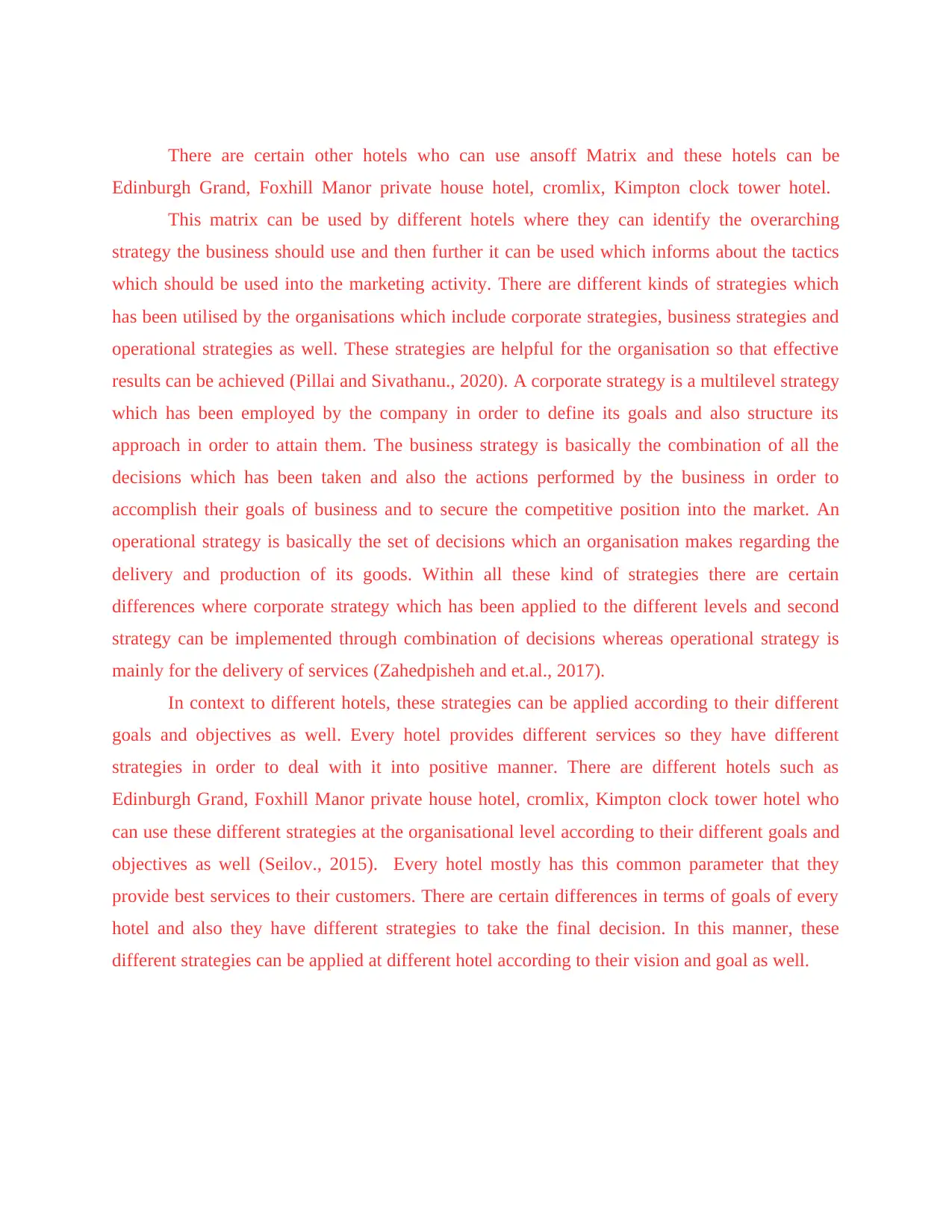
There are certain other hotels who can use ansoff Matrix and these hotels can be
Edinburgh Grand, Foxhill Manor private house hotel, cromlix, Kimpton clock tower hotel.
This matrix can be used by different hotels where they can identify the overarching
strategy the business should use and then further it can be used which informs about the tactics
which should be used into the marketing activity. There are different kinds of strategies which
has been utilised by the organisations which include corporate strategies, business strategies and
operational strategies as well. These strategies are helpful for the organisation so that effective
results can be achieved (Pillai and Sivathanu., 2020). A corporate strategy is a multilevel strategy
which has been employed by the company in order to define its goals and also structure its
approach in order to attain them. The business strategy is basically the combination of all the
decisions which has been taken and also the actions performed by the business in order to
accomplish their goals of business and to secure the competitive position into the market. An
operational strategy is basically the set of decisions which an organisation makes regarding the
delivery and production of its goods. Within all these kind of strategies there are certain
differences where corporate strategy which has been applied to the different levels and second
strategy can be implemented through combination of decisions whereas operational strategy is
mainly for the delivery of services (Zahedpisheh and et.al., 2017).
In context to different hotels, these strategies can be applied according to their different
goals and objectives as well. Every hotel provides different services so they have different
strategies in order to deal with it into positive manner. There are different hotels such as
Edinburgh Grand, Foxhill Manor private house hotel, cromlix, Kimpton clock tower hotel who
can use these different strategies at the organisational level according to their different goals and
objectives as well (Seilov., 2015). Every hotel mostly has this common parameter that they
provide best services to their customers. There are certain differences in terms of goals of every
hotel and also they have different strategies to take the final decision. In this manner, these
different strategies can be applied at different hotel according to their vision and goal as well.
Edinburgh Grand, Foxhill Manor private house hotel, cromlix, Kimpton clock tower hotel.
This matrix can be used by different hotels where they can identify the overarching
strategy the business should use and then further it can be used which informs about the tactics
which should be used into the marketing activity. There are different kinds of strategies which
has been utilised by the organisations which include corporate strategies, business strategies and
operational strategies as well. These strategies are helpful for the organisation so that effective
results can be achieved (Pillai and Sivathanu., 2020). A corporate strategy is a multilevel strategy
which has been employed by the company in order to define its goals and also structure its
approach in order to attain them. The business strategy is basically the combination of all the
decisions which has been taken and also the actions performed by the business in order to
accomplish their goals of business and to secure the competitive position into the market. An
operational strategy is basically the set of decisions which an organisation makes regarding the
delivery and production of its goods. Within all these kind of strategies there are certain
differences where corporate strategy which has been applied to the different levels and second
strategy can be implemented through combination of decisions whereas operational strategy is
mainly for the delivery of services (Zahedpisheh and et.al., 2017).
In context to different hotels, these strategies can be applied according to their different
goals and objectives as well. Every hotel provides different services so they have different
strategies in order to deal with it into positive manner. There are different hotels such as
Edinburgh Grand, Foxhill Manor private house hotel, cromlix, Kimpton clock tower hotel who
can use these different strategies at the organisational level according to their different goals and
objectives as well (Seilov., 2015). Every hotel mostly has this common parameter that they
provide best services to their customers. There are certain differences in terms of goals of every
hotel and also they have different strategies to take the final decision. In this manner, these
different strategies can be applied at different hotel according to their vision and goal as well.
⊘ This is a preview!⊘
Do you want full access?
Subscribe today to unlock all pages.

Trusted by 1+ million students worldwide
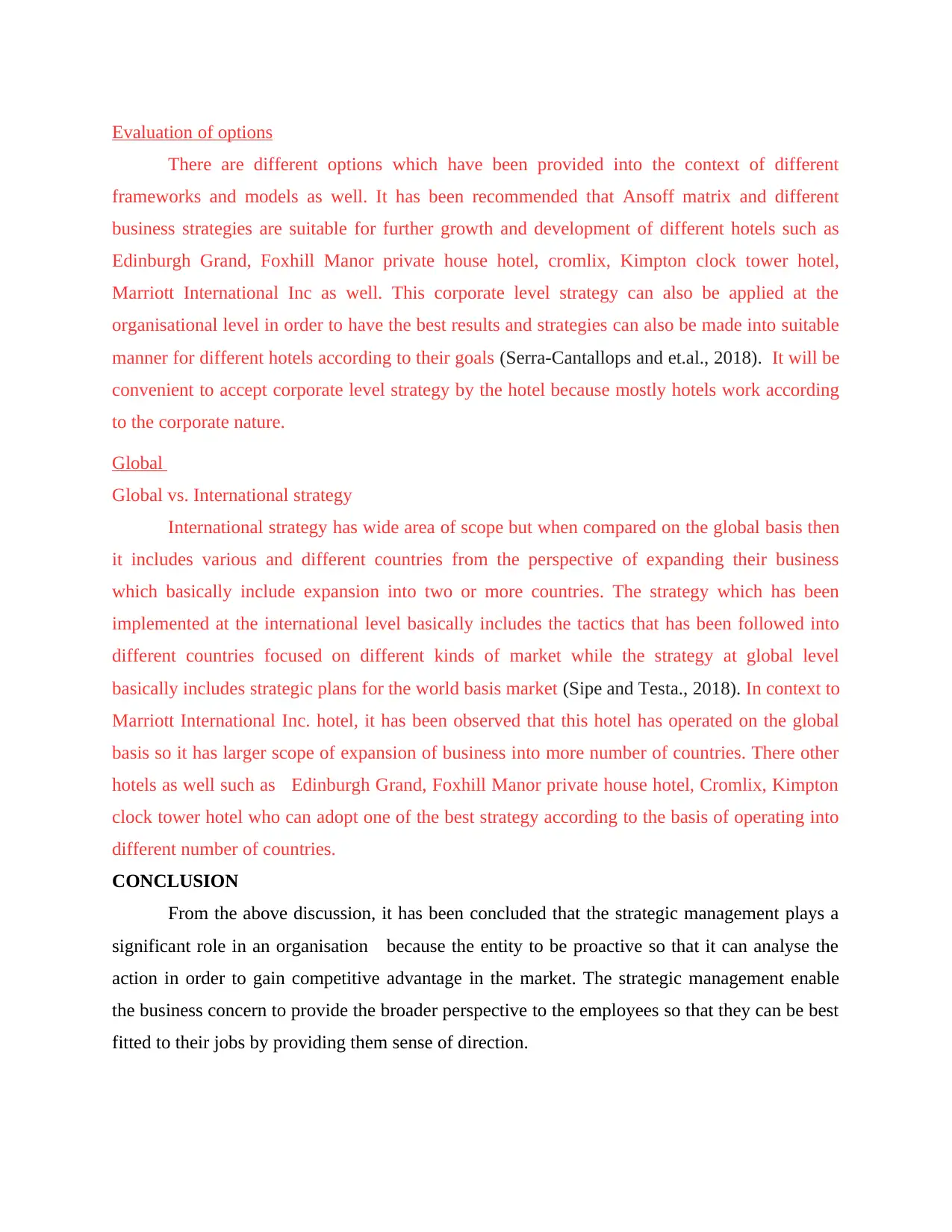
Evaluation of options
There are different options which have been provided into the context of different
frameworks and models as well. It has been recommended that Ansoff matrix and different
business strategies are suitable for further growth and development of different hotels such as
Edinburgh Grand, Foxhill Manor private house hotel, cromlix, Kimpton clock tower hotel,
Marriott International Inc as well. This corporate level strategy can also be applied at the
organisational level in order to have the best results and strategies can also be made into suitable
manner for different hotels according to their goals (Serra-Cantallops and et.al., 2018). It will be
convenient to accept corporate level strategy by the hotel because mostly hotels work according
to the corporate nature.
Global
Global vs. International strategy
International strategy has wide area of scope but when compared on the global basis then
it includes various and different countries from the perspective of expanding their business
which basically include expansion into two or more countries. The strategy which has been
implemented at the international level basically includes the tactics that has been followed into
different countries focused on different kinds of market while the strategy at global level
basically includes strategic plans for the world basis market (Sipe and Testa., 2018). In context to
Marriott International Inc. hotel, it has been observed that this hotel has operated on the global
basis so it has larger scope of expansion of business into more number of countries. There other
hotels as well such as Edinburgh Grand, Foxhill Manor private house hotel, Cromlix, Kimpton
clock tower hotel who can adopt one of the best strategy according to the basis of operating into
different number of countries.
CONCLUSION
From the above discussion, it has been concluded that the strategic management plays a
significant role in an organisation because the entity to be proactive so that it can analyse the
action in order to gain competitive advantage in the market. The strategic management enable
the business concern to provide the broader perspective to the employees so that they can be best
fitted to their jobs by providing them sense of direction.
There are different options which have been provided into the context of different
frameworks and models as well. It has been recommended that Ansoff matrix and different
business strategies are suitable for further growth and development of different hotels such as
Edinburgh Grand, Foxhill Manor private house hotel, cromlix, Kimpton clock tower hotel,
Marriott International Inc as well. This corporate level strategy can also be applied at the
organisational level in order to have the best results and strategies can also be made into suitable
manner for different hotels according to their goals (Serra-Cantallops and et.al., 2018). It will be
convenient to accept corporate level strategy by the hotel because mostly hotels work according
to the corporate nature.
Global
Global vs. International strategy
International strategy has wide area of scope but when compared on the global basis then
it includes various and different countries from the perspective of expanding their business
which basically include expansion into two or more countries. The strategy which has been
implemented at the international level basically includes the tactics that has been followed into
different countries focused on different kinds of market while the strategy at global level
basically includes strategic plans for the world basis market (Sipe and Testa., 2018). In context to
Marriott International Inc. hotel, it has been observed that this hotel has operated on the global
basis so it has larger scope of expansion of business into more number of countries. There other
hotels as well such as Edinburgh Grand, Foxhill Manor private house hotel, Cromlix, Kimpton
clock tower hotel who can adopt one of the best strategy according to the basis of operating into
different number of countries.
CONCLUSION
From the above discussion, it has been concluded that the strategic management plays a
significant role in an organisation because the entity to be proactive so that it can analyse the
action in order to gain competitive advantage in the market. The strategic management enable
the business concern to provide the broader perspective to the employees so that they can be best
fitted to their jobs by providing them sense of direction.
Paraphrase This Document
Need a fresh take? Get an instant paraphrase of this document with our AI Paraphraser
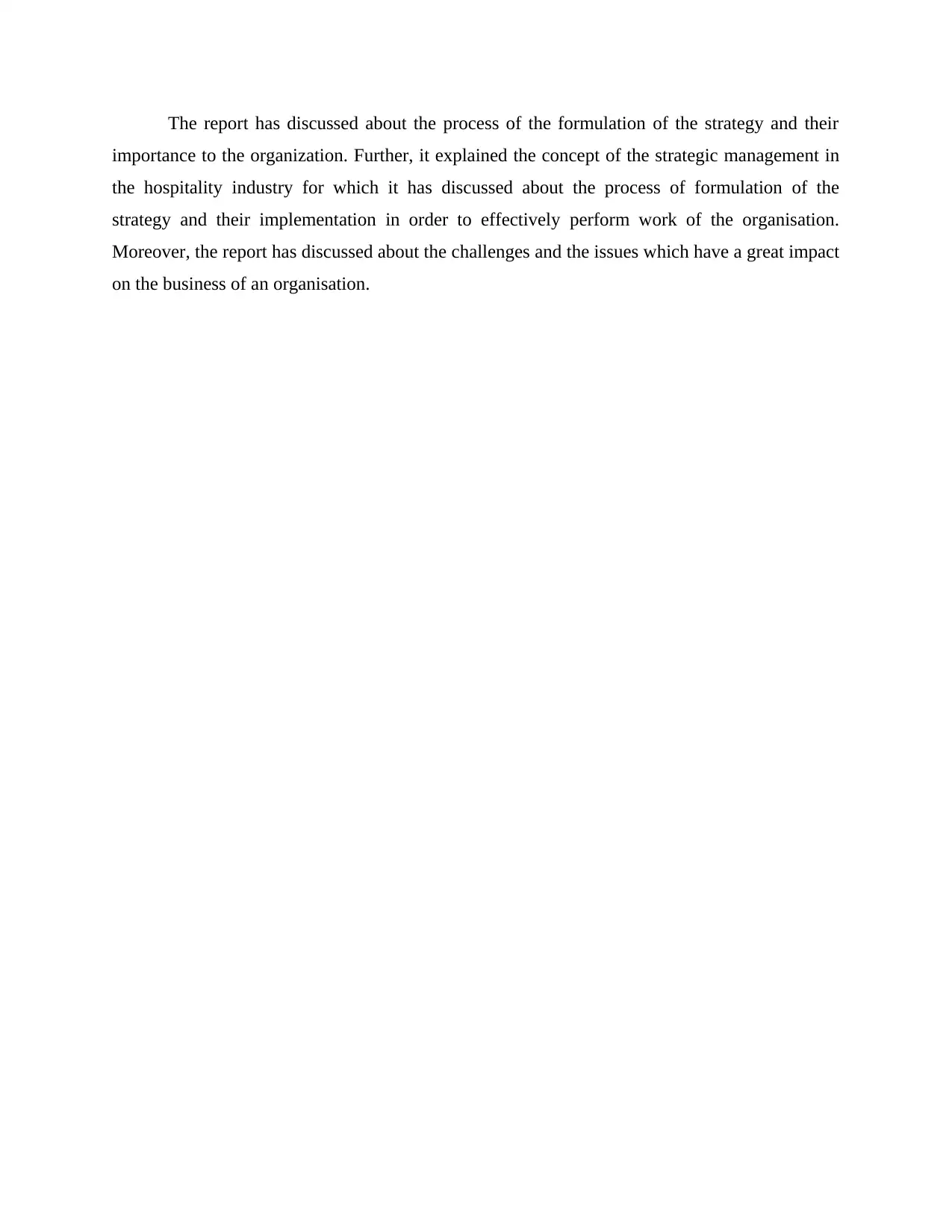
The report has discussed about the process of the formulation of the strategy and their
importance to the organization. Further, it explained the concept of the strategic management in
the hospitality industry for which it has discussed about the process of formulation of the
strategy and their implementation in order to effectively perform work of the organisation.
Moreover, the report has discussed about the challenges and the issues which have a great impact
on the business of an organisation.
importance to the organization. Further, it explained the concept of the strategic management in
the hospitality industry for which it has discussed about the process of formulation of the
strategy and their implementation in order to effectively perform work of the organisation.
Moreover, the report has discussed about the challenges and the issues which have a great impact
on the business of an organisation.
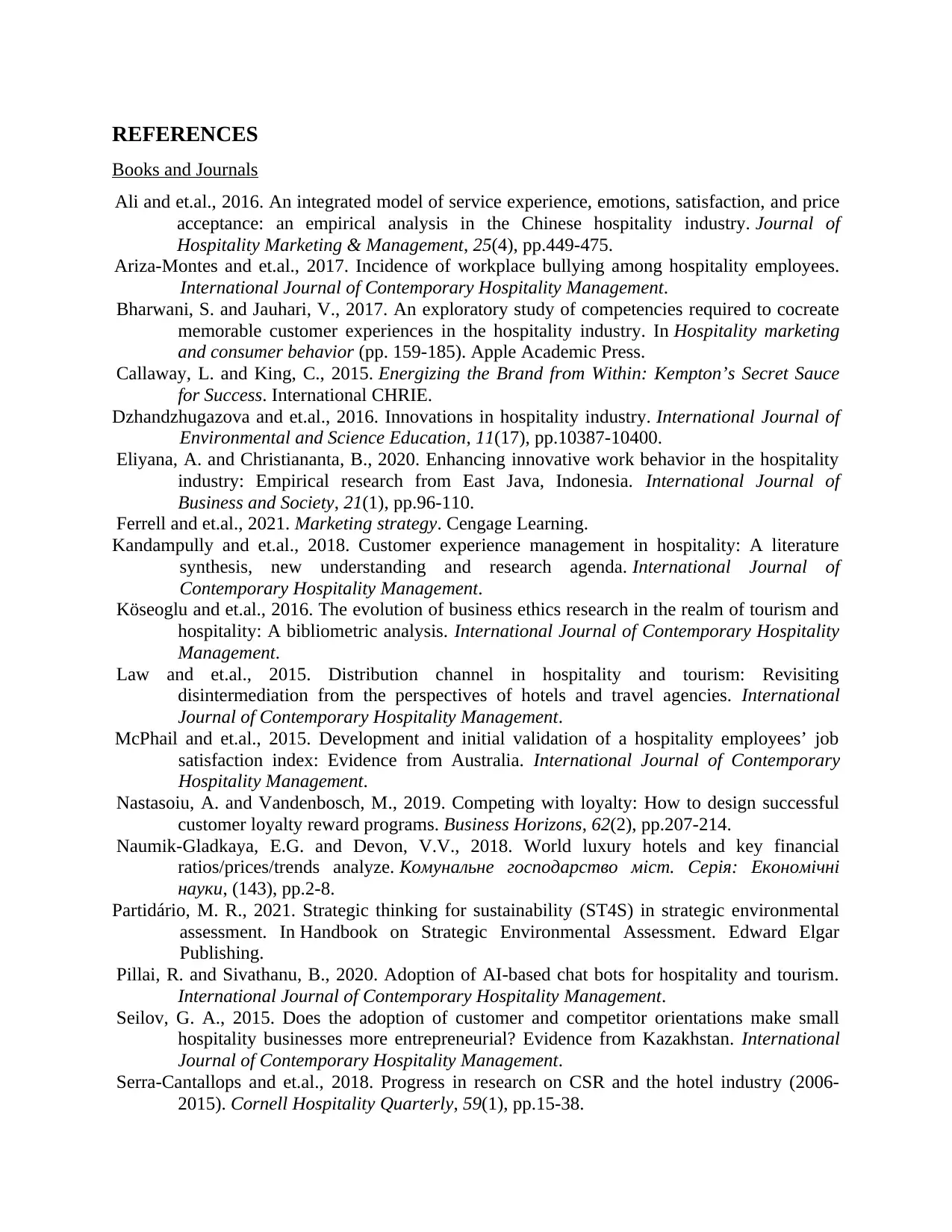
REFERENCES
Books and Journals
Ali and et.al., 2016. An integrated model of service experience, emotions, satisfaction, and price
acceptance: an empirical analysis in the Chinese hospitality industry. Journal of
Hospitality Marketing & Management, 25(4), pp.449-475.
Ariza-Montes and et.al., 2017. Incidence of workplace bullying among hospitality employees.
International Journal of Contemporary Hospitality Management.
Bharwani, S. and Jauhari, V., 2017. An exploratory study of competencies required to cocreate
memorable customer experiences in the hospitality industry. In Hospitality marketing
and consumer behavior (pp. 159-185). Apple Academic Press.
Callaway, L. and King, C., 2015. Energizing the Brand from Within: Kempton’s Secret Sauce
for Success. International CHRIE.
Dzhandzhugazova and et.al., 2016. Innovations in hospitality industry. International Journal of
Environmental and Science Education, 11(17), pp.10387-10400.
Eliyana, A. and Christiananta, B., 2020. Enhancing innovative work behavior in the hospitality
industry: Empirical research from East Java, Indonesia. International Journal of
Business and Society, 21(1), pp.96-110.
Ferrell and et.al., 2021. Marketing strategy. Cengage Learning.
Kandampully and et.al., 2018. Customer experience management in hospitality: A literature
synthesis, new understanding and research agenda. International Journal of
Contemporary Hospitality Management.
Köseoglu and et.al., 2016. The evolution of business ethics research in the realm of tourism and
hospitality: A bibliometric analysis. International Journal of Contemporary Hospitality
Management.
Law and et.al., 2015. Distribution channel in hospitality and tourism: Revisiting
disintermediation from the perspectives of hotels and travel agencies. International
Journal of Contemporary Hospitality Management.
McPhail and et.al., 2015. Development and initial validation of a hospitality employees’ job
satisfaction index: Evidence from Australia. International Journal of Contemporary
Hospitality Management.
Nastasoiu, A. and Vandenbosch, M., 2019. Competing with loyalty: How to design successful
customer loyalty reward programs. Business Horizons, 62(2), pp.207-214.
Naumik-Gladkaya, E.G. and Devon, V.V., 2018. World luxury hotels and key financial
ratios/prices/trends analyze. Комунальне господарство міст. Серія: Економічні
науки, (143), pp.2-8.
Partidário, M. R., 2021. Strategic thinking for sustainability (ST4S) in strategic environmental
assessment. In Handbook on Strategic Environmental Assessment. Edward Elgar
Publishing.
Pillai, R. and Sivathanu, B., 2020. Adoption of AI-based chat bots for hospitality and tourism.
International Journal of Contemporary Hospitality Management.
Seilov, G. A., 2015. Does the adoption of customer and competitor orientations make small
hospitality businesses more entrepreneurial? Evidence from Kazakhstan. International
Journal of Contemporary Hospitality Management.
Serra-Cantallops and et.al., 2018. Progress in research on CSR and the hotel industry (2006-
2015). Cornell Hospitality Quarterly, 59(1), pp.15-38.
Books and Journals
Ali and et.al., 2016. An integrated model of service experience, emotions, satisfaction, and price
acceptance: an empirical analysis in the Chinese hospitality industry. Journal of
Hospitality Marketing & Management, 25(4), pp.449-475.
Ariza-Montes and et.al., 2017. Incidence of workplace bullying among hospitality employees.
International Journal of Contemporary Hospitality Management.
Bharwani, S. and Jauhari, V., 2017. An exploratory study of competencies required to cocreate
memorable customer experiences in the hospitality industry. In Hospitality marketing
and consumer behavior (pp. 159-185). Apple Academic Press.
Callaway, L. and King, C., 2015. Energizing the Brand from Within: Kempton’s Secret Sauce
for Success. International CHRIE.
Dzhandzhugazova and et.al., 2016. Innovations in hospitality industry. International Journal of
Environmental and Science Education, 11(17), pp.10387-10400.
Eliyana, A. and Christiananta, B., 2020. Enhancing innovative work behavior in the hospitality
industry: Empirical research from East Java, Indonesia. International Journal of
Business and Society, 21(1), pp.96-110.
Ferrell and et.al., 2021. Marketing strategy. Cengage Learning.
Kandampully and et.al., 2018. Customer experience management in hospitality: A literature
synthesis, new understanding and research agenda. International Journal of
Contemporary Hospitality Management.
Köseoglu and et.al., 2016. The evolution of business ethics research in the realm of tourism and
hospitality: A bibliometric analysis. International Journal of Contemporary Hospitality
Management.
Law and et.al., 2015. Distribution channel in hospitality and tourism: Revisiting
disintermediation from the perspectives of hotels and travel agencies. International
Journal of Contemporary Hospitality Management.
McPhail and et.al., 2015. Development and initial validation of a hospitality employees’ job
satisfaction index: Evidence from Australia. International Journal of Contemporary
Hospitality Management.
Nastasoiu, A. and Vandenbosch, M., 2019. Competing with loyalty: How to design successful
customer loyalty reward programs. Business Horizons, 62(2), pp.207-214.
Naumik-Gladkaya, E.G. and Devon, V.V., 2018. World luxury hotels and key financial
ratios/prices/trends analyze. Комунальне господарство міст. Серія: Економічні
науки, (143), pp.2-8.
Partidário, M. R., 2021. Strategic thinking for sustainability (ST4S) in strategic environmental
assessment. In Handbook on Strategic Environmental Assessment. Edward Elgar
Publishing.
Pillai, R. and Sivathanu, B., 2020. Adoption of AI-based chat bots for hospitality and tourism.
International Journal of Contemporary Hospitality Management.
Seilov, G. A., 2015. Does the adoption of customer and competitor orientations make small
hospitality businesses more entrepreneurial? Evidence from Kazakhstan. International
Journal of Contemporary Hospitality Management.
Serra-Cantallops and et.al., 2018. Progress in research on CSR and the hotel industry (2006-
2015). Cornell Hospitality Quarterly, 59(1), pp.15-38.
⊘ This is a preview!⊘
Do you want full access?
Subscribe today to unlock all pages.

Trusted by 1+ million students worldwide
1 out of 14
Related Documents
Your All-in-One AI-Powered Toolkit for Academic Success.
+13062052269
info@desklib.com
Available 24*7 on WhatsApp / Email
![[object Object]](/_next/static/media/star-bottom.7253800d.svg)
Unlock your academic potential
Copyright © 2020–2026 A2Z Services. All Rights Reserved. Developed and managed by ZUCOL.




